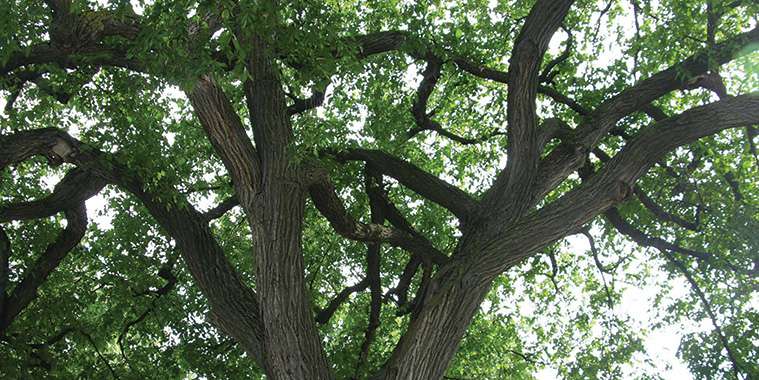by Dorothy Dobbie
Since I started writing this column in 2017, I have only written a dozen articles about trees. That astonishes me as trees are my passion and they are so important to you.
You have probably all heard by now about the Swiss report that planting a trillion trees could resolve the global carbon pollution problem. Most people envision vast forests when this issue comes up but I have a different point of view. I think we should concentrate on planting as many tree as we can in cities. I have planted twenty trees in my yard and two (an oak and a Chinese elm) that planted themselves. Half of my trees are evergreens: cedars, spruce and one fir, and all provide insulation for my home in winter and habitat for the birds against the rainiest and coldest days. I would have many more trees, but I like to retain a little sunshine for the garden, so it’s a balancing act. Nevertheless, I cannot resist shrubs and the count there is about the same and I have an additional dozen or so dwarf shrubs and roses. All of these sequester carbon and all are worth planting.
So last week, on National Tree Day, Mayor Brian Bowman issued a challenge to every citizen to plant a tree by 2035 when Winnipeg is projected to reach a million people. We also received, through Tree Canada and funded by CN Rail to celebrate its 100th birthday, a gift of $1 million to plant trees in our City this year. Tree Canada will work with Trees Winnipeg and a committee headed by Dave Angus in deploying this money to get the most trees planted that we can.
So, why all the fuss?
Trees are more than just ornaments in our yards and on our streets. They suck tonnes of carbon out of the air, as demonstrated by the Swiss report. They also promote health and well-being among our citizens by cleaning up more than just carbons: they clean ground water of heavy metals, help regulate water flow, provide moisture in the atmosphere for other plants and animals to breathe, offer shelter to birds and dozens of species from small animals to important insects, and they impart health giving terpenes and other air soluble compositions beneficial to life.
Elm trees and lilacs are very good at mitigating salt laid down on city streets, taking it up and storing it in their twigs and bark. Poplars and willows grow quickly and it is while they are growing that they do their best work in the atmosphere.
Currently, the city plants “caliper” tress, generally six feet tall and a couple of inches in diameter, but whips, small trees of one to two feet tall, will catch up to the caliper trees in three years and will be better established and more resilient against the harshness of city life than the larger trees. They are also much cheaper to plant — planting a boulevard tree can cost up to $800 and many of them do not survive the shock, especially since the city doesn’t always water and maintain them.
Little trees do need protection if planted in heavily trafficked areas, but surrounding them with what I call “tree havens” is a lot cheaper than the alternative caliper plantings. Small trees can also be planted by individuals, without the need for expensive heavy equipment.
This year, the civic budget for reforestation has been reduced from $776,000 to $338,000 and will be further reduced by 2022, to $191,000. Where we used to plant at least 2,500 public trees a year, we will now plant only 1,000. But, due to disease such as the cottony ash psyllid and the Dutch elm beetle, City crews are taking down 10,000 public trees each year. The idea of tree stripped streets should horrify every homeowner who will see their property values plummet.
We must do more to save one of our greatest assets, our urban forest. Tell your city Councillor and your MLA that trees in public places is a priority. And take up the Mayor’s challenge and plant a tree — or several — this fall.
Dorothy Dobbie is a board member and the former Chair of Tree Canada and former president of Trees Winnipeg. She publishes Manitoba Gardener and Lifestyles 55. You can reach her at 204-940-2700.



